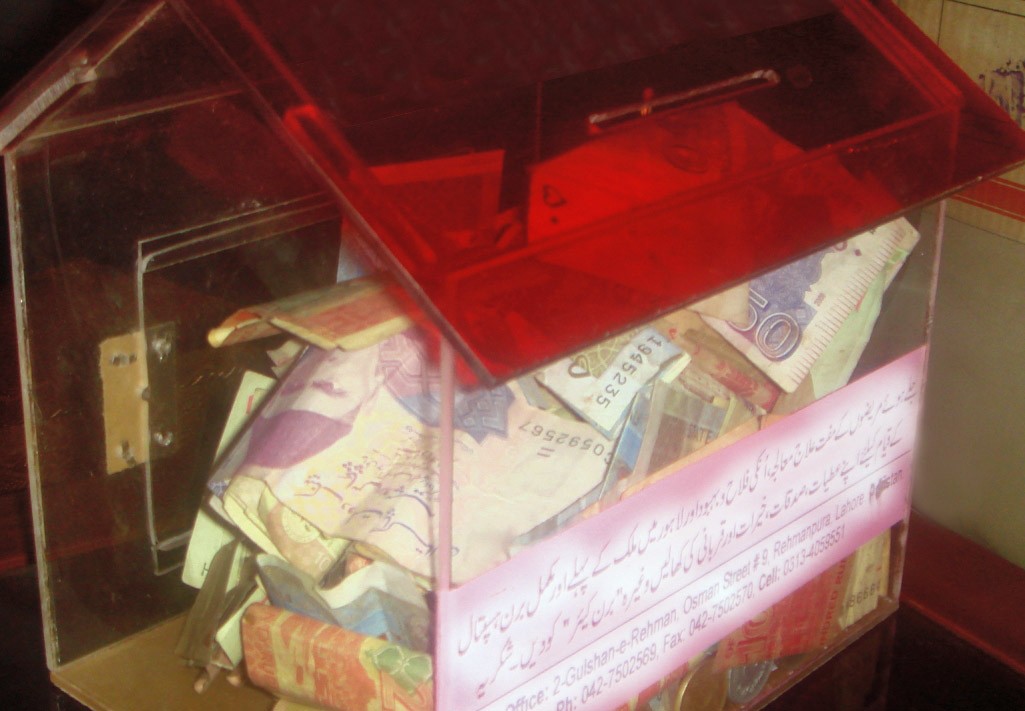
Mystery surrounds the ownership and use of the donation boxes that are now commonly found at different pharmacies and grocery shops

Ever spotted at a grocery store or a chemist’s, a small plastic box that is usually placed close to the payment counter? In all probability, you did. Well, it’s a donation box. And, it is most likely that you slipped a few coins in, every time you ran into one.
The boxes are particularly to be found at pharmacies that are in close proximity with a hospital or a private clinic. The ones inside the mosques are, perhaps, the most common. And, these are never found empty.
Though the donation boxes aren’t peculiar to Lahore only, their increasing presence at various shopping outlets, in and around town, is something that indicates more than just a popular trend of giving money for different charitable causes.
For common people like Shahnaz Bibi (real name changed), it entails an act of ‘sadka’. "I’ve been asked by my pir to give Rs500 to charity every Thursday if I mean my ailing child to get well soon. So, here I am," she says, standing inside a pharmacy in Faisal Town, right across Jinnah Hospital.
Interestingly, nobody knows where the donation boxes are coming from or will go to. But do they care? Ijaz Ali, a customer at a medicine shop near Ganga Ram Hospital, says out loud, "Allah is Benevolent! Who are we to probe where the charity money goes."
There is a rub. Much of this activity goes unnoticed by the government. In other words, it is undocumented; there is no data available on the actual number of such ‘donation boxes’ in the city. Though, a secret agency official once put it down to 120,000.
Transparency is lacking even in regards to the ownership of the donation boxes. The shopkeepers who display these boxes rarely know who owns them actually, how much funds are thus generated and how these are utilised.
"Such charity money never undergoes audit," says a senior official at the Interior Ministry, requesting anonymity. "The managers of these donation boxes think they are not accountable to anyone. For its part, the government also never asks for an audit of donations collected in the name of religion or humanitarian causes.
As per the information received from the office of the IG Police, around 40 organisations pose as if they are engaged in some sort of charity work. Most of these organisations are banned and not allowed to collect donations. But the state is tricked, with a certain change of name.
It is no secret today that the law enforcement agencies, various tiers of state and the judiciary too would not raise eyebrows on the mode of functioning of such banned outfits and their ‘use’ of donation money. Some government authorities are also said to patronise some of the organisations with overtly religious ambitions.
A pharmacy near Mayo Hospital has a donation box that bears the name ‘Falah-e-Insaniat Foundation.’ Rashid Rehman, the shop owner, says "it’s a charity wing of Jama’at-ud-Dawa.
"I also used to donate to it," he reveals. No wonder he never bothered to inquire about the reality of the donation box. "If the money is misappropriated or misused, Allah will punish them. Our job is to donate, not do policing."
On the other hand, a member of one such organisation reveals, requesting anonymity, that "we have installed more than 300 donation boxes at different points in the city. Our overall collections range somewhere between Rs30,000-60,000 a month."
He also claims that the common people, the shopkeepers as well as the law enforcement agencies have always supported their charity mission.
Meanwhile, directives have been issued, under the National Action Plan (NAC), in collaboration with the Interior Ministry and the National Counter-Terrorism Authority (Nacta), to stop defunct organisations from raising funds through charity boxes or whatever. Recently, the city police conducted an operation against the display of such boxes. The Civil Lines Police, on the instructions of the Deputy Inspector General (Operations) Dr Haider Ashraf, confiscated 13 such boxes during the raid.
In another such move, Assistant Commissioner, Tehsil Cantt Lahore, Rao Imtiaz has announced not to install the charity boxes in cantonment area and warned of dire consequences if the order is violated.
A police official holds the City District Government Lahore DCO Capt (retd) Muhammad Usman responsible for the scam. "The Charitable Funds (Regulation of Collections Act, 1953) bars such collection of charity unless it is sanctioned by the government and properly audited," he says.
It’s an allegation that DCO spokesman Imran rejects outrightly. "No organisation ever seeks permission for installing charity boxes," he says. "It is the domain of the Interior Ministry and the police."
In the final analysis, it is the responsibility of the common people to ascertain as to who truly deserves their valuable donation.